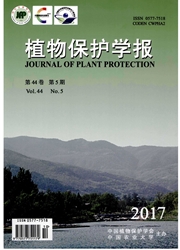

 中文摘要:
中文摘要:
在寄生蜂与寄主相互作用的研究中,揭示寄生蜂攻克寄主防御系统和调控寄主生长发育的分子机制,已成为生物防治领域的研究热点。有关研究表明:寄生蜂通过控制血细胞增殖与分化的转录/信号传导因子、调节血细胞延影包囊的因子及诱导血细胞凋亡,以破坏寄主细胞免疫系统;干扰与血淋巴黑化相关基因及抗菌肽基因的表达以抑制寄主的体液免疫反应;调节与生长发育相关蛋白和酶类以扰乱寄主生长发育。作者从细胞免疫、体液免疫和对寄主生长发育三个方面综述了寄生蜂调控寄主分子机制的研究进展。
 英文摘要:
英文摘要:
Regarding to the parasitoid-host interactions, the investigation of molecular mechanisms of parasitoid circumventing host defense system and manipulating host development is a focal researching point in the biological control area. To disrupt hosts cellular immune response, parasitoids are capable of controlling the transcriptional and signal factors critical for hemocyte proliferation and differentiation, regulating the factors involved in hemocyte encapsulation and spreading, and inducing hemocyte apoptosis. To suppress host humoral immune defense, they are able to intervene in the expression of hemolymph melanization related genes and antibacterial peptide genes. To disturb host development, they are with the ability to modulate the proteins and enzymes key to development. In this article, we present a brief overview of the recently documented information concerning these studies.
 同期刊论文项目
同期刊论文项目
 同项目期刊论文
同项目期刊论文
 A heat shock cognate 70 gene in the endoparasitoid, Pteromalus puparum, and its expression in relati
A heat shock cognate 70 gene in the endoparasitoid, Pteromalus puparum, and its expression in relati Morphology and ultrastructure of the venom apparatus in the endoparasitic wasp Pteromalus puparum (H
Morphology and ultrastructure of the venom apparatus in the endoparasitic wasp Pteromalus puparum (H Venom of Pteromalus puparum (Hymenoptera: Pteromalidae) Induced Endocrine Changes in the Hemolymph o
Venom of Pteromalus puparum (Hymenoptera: Pteromalidae) Induced Endocrine Changes in the Hemolymph o cDNA of an arylphorin-type storage protein gene from Pieris rapae with parasitism inducible expressi
cDNA of an arylphorin-type storage protein gene from Pieris rapae with parasitism inducible expressi Molecular cloning and characterization of acid phosphatase in venom of the endoparasitoid wasp Ptero
Molecular cloning and characterization of acid phosphatase in venom of the endoparasitoid wasp Ptero 期刊信息
期刊信息
